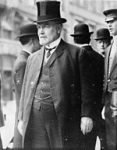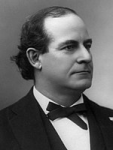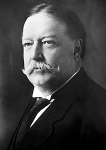- Location
- Municipal Commune of Bourne
- Pronouns
- He/Him
cross posting here
A Rum Lot
Monarchs / Consorts of the British Empire
1910-1915: George V / Mary of Teck (Saxe-Coburg and Gotha)
1915-1917: Edward VIII / vacant (Saxe-Coburg and Gotha)
1917-1937: Edward VIII / vacant (Wettin)
1937-0000: Edward VIII / Ethel du Pont (Wettin)
Prime Ministers of the United Kingdom of Great Britain and Ireland
1906-1915: H.H. Asquith (Liberal)
1910 (Minority, with Irish Nationalist c&s) def. Arthur Balfour (Unionist), John Redmond / William O'Brien (Irish Nationalists), Arthur Henderson (Labour)
1910 (Minority, with Irish Nationalist c&s) def. Arthur Balfour (Unionist), John Redmond / William O'Brien (Irish Nationalists), George Barnes (Labour)
1915 Formation of War Government with Unionists and Labour
1915-1920: Herbert Kitchener, 1st Earl Kitchener (Independent)
1915 Leading War Government with Unionists, Liberals and Labour
1919 Peace of Hanover - Armistice with the Central Powers; Formation of Emergency Government
1920-1925: Winston Churchill (Liberal / Constitutional)
1920 Leading Emergency Government with Unionists and British Workers' League
1920 Merger of Government parties into Constitutional Party
1922 (Majority) def.Ramsay MacDonald (Independent Labour), Reginald McKenna (Independent Liberal)
1924 Re-establishment of Emergency Government
1925-1929: Edward Carson (Constitutional)
1925 Leading Emergency Government
1929-0000: Walter Guinness (Constitutional)
1929 (Majority) def. Denis Gorey (Farmers')
1933 (Majority) def. Michael Heffernan (Farmers')
1937 (Majority) def. Frank MacDermot (National Farmers' and Ratepayers' League)
Presidents of the United States of America
1909-1913: William Howard Taft (Republican)
1908 (with James S. Sherman) def. William Jennings Bryan (Democratic)
1913-1917: Theodore Roosevelt II (Progressive / Republican / Nationalist)
1912 (with Hiram Johnson) def. Champ Clark (Democratic), William Howard Taft (Republican)
1917-1925: William Randolph Hearst (Democratic / National Independence)
1916 (with Judson Harmon) def. Theodore Roosevelt II (Nationalist), Hiram Johnson (Progressive), Charles W. Fairbanks (Republican)
1920 (with Eugene Foss) def. Leonard Wood (Nationalist / Republican), John M. Parker (Democratic / Progressive), Eugene V. Debs (Socialist)
1925-1927: Henry L. Stimson (Nationalist)
1924 (with Robert E. Wood) def. William Randolph Hearst (National Independence), Ellison D. Smith (Democratic)
1927-1937: Robert E. Wood (Nationalist)
1928 (with Herbert Hoover) def. Theodore G. Bilbo (Democratic), William Randolph Hearst (National Independence)
1932 (with Hanford MacNider) def. Theodore G. Bilbo (Democratic), Al Smith (National Independence)
1937-0000: Hanford MacNider (Nationalist)
1936 (with Joseph P. Kennedy Sr.) def. Harry F. Byrd Sr. (Democratic)
Britain had a very, very bad experience in the Great War. From losing a generation of fighting men to the mud of Flanders, to essentially collapsing the credibility of their most enthusiastic ally Teddy Roosevelt with financial shenanigans, to King George's ignominious death from being thrown from his horse, to finally seeing the bulk of their army encircled in a last ditch defence of Paris, it was a universal shitshow.
The result was years of close-to and then outright military government (in the two decades between 1910 and 1929, only one election was held and that was considered something of a farce). The solidification of a new governmental establishment that didn't like testing it's mettle on the electoral battlefield was matched by a rapid radicalisation on the streets as a haggard gang of soldiers returned from a Europe now shaped in the Kaiser's image, to delve into the works of Marx, Kropotkin and DeLeon. The 1922 election was decried as ILP candidates were turned away from hustings under legislation that carried forward DORA components into peacetime. Similarly, Sinn Fein candidates found it impossible to campaign as the streets were flooded with 'Black and Tan' paramilitaries to hold down the island.
The irony of the bloody effort to keep Ireland within the United Kingdom is that within a few short years, that would be all the United Kingdom consisted of. The British Revolution thrived as much of the military which could have put it down were at that time in Ireland. By 1925, a weary Edward Carson spiritually kissed the hands of his younger royal namesake, as the ragged Emergency Government re-coalesced in the halls of the Royal College of Science in Dublin.
King Edward himself spent less and less time in his supposed primary title, and more in Canada - far from syndicalist revolutionaries or Fenian terror bombs - and in it's southern neighbour. Roosevelt's defeat in 1916 had seen the United States briefly flip sides in the Great War, but Hearst won few concessions from the British Empire. Hearst himself had presided over an increasingly authoritarian state as his government failed to resolve the economic crisis that had begun in 1914, that only deepened when he unilaterally halted sales of munitions to the Entente. While Stimson promised a return to normalcy, he was impeached after the British Revolution. King Edward soon became fast friends with the new President Wood. A new economic boom has begun as British aristocracy has begun moving it's wealth back across the pond. More importantly the security of the Empire has been bolstered by the new alliance with Wood's regime. Wood has presided over a policy of Preparedness, to confront the German and Japanese Empires in either the Atlantic or Pacific Oceans. Ireland has become the eastern flank of the United States military, thousands of doughboys making the Emerald Isle safe for the Wettins and their chosen administrators.
Such an alliance has been deepened by the King's marriage to a member of America's own aristocracy and the final collapse of vestiges of real opposition to the Nationalists as a former Hearst Man, Joe Kennedy has accepted the Vice Presidency alongside Wood's acolyte MacNider. This of course has seen some loosening in Ireland proper to satisfy the Irish-Americans lately brought into the governing coalition in the United States. But like America itself, the opposition in the reformed UK Parliament is a token, quiet, 'patriotic' one.
THE IRISH? Maybe!
A Rum Lot
Monarchs / Consorts of the British Empire
1910-1915: George V / Mary of Teck (Saxe-Coburg and Gotha)
1915-1917: Edward VIII / vacant (Saxe-Coburg and Gotha)
1917-1937: Edward VIII / vacant (Wettin)
1937-0000: Edward VIII / Ethel du Pont (Wettin)
Prime Ministers of the United Kingdom of Great Britain and Ireland
1906-1915: H.H. Asquith (Liberal)
1910 (Minority, with Irish Nationalist c&s) def. Arthur Balfour (Unionist), John Redmond / William O'Brien (Irish Nationalists), Arthur Henderson (Labour)
1910 (Minority, with Irish Nationalist c&s) def. Arthur Balfour (Unionist), John Redmond / William O'Brien (Irish Nationalists), George Barnes (Labour)
1915 Formation of War Government with Unionists and Labour
1915-1920: Herbert Kitchener, 1st Earl Kitchener (Independent)
1915 Leading War Government with Unionists, Liberals and Labour
1919 Peace of Hanover - Armistice with the Central Powers; Formation of Emergency Government
1920-1925: Winston Churchill (Liberal / Constitutional)
1920 Leading Emergency Government with Unionists and British Workers' League
1920 Merger of Government parties into Constitutional Party
1922 (Majority) def.
1924 Re-establishment of Emergency Government
1925-1929: Edward Carson (Constitutional)
1925 Leading Emergency Government
1929-0000: Walter Guinness (Constitutional)
1929 (Majority) def. Denis Gorey (Farmers')
1933 (Majority) def. Michael Heffernan (Farmers')
1937 (Majority) def. Frank MacDermot (National Farmers' and Ratepayers' League)
Presidents of the United States of America
1909-1913: William Howard Taft (Republican)
1908 (with James S. Sherman) def. William Jennings Bryan (Democratic)
1913-1917: Theodore Roosevelt II (Progressive / Republican / Nationalist)
1912 (with Hiram Johnson) def. Champ Clark (Democratic), William Howard Taft (Republican)
1917-1925: William Randolph Hearst (Democratic / National Independence)
1916 (with Judson Harmon) def. Theodore Roosevelt II (Nationalist), Hiram Johnson (Progressive), Charles W. Fairbanks (Republican)
1920 (with Eugene Foss) def. Leonard Wood (Nationalist / Republican), John M. Parker (Democratic / Progressive),
1925-1927: Henry L. Stimson (Nationalist)
1924 (with Robert E. Wood) def. William Randolph Hearst (National Independence), Ellison D. Smith (Democratic)
1927-1937: Robert E. Wood (Nationalist)
1928 (with Herbert Hoover) def. Theodore G. Bilbo (Democratic), William Randolph Hearst (National Independence)
1932 (with Hanford MacNider) def. Theodore G. Bilbo (Democratic), Al Smith (National Independence)
1937-0000: Hanford MacNider (Nationalist)
1936 (with Joseph P. Kennedy Sr.) def. Harry F. Byrd Sr. (Democratic)
Britain had a very, very bad experience in the Great War. From losing a generation of fighting men to the mud of Flanders, to essentially collapsing the credibility of their most enthusiastic ally Teddy Roosevelt with financial shenanigans, to King George's ignominious death from being thrown from his horse, to finally seeing the bulk of their army encircled in a last ditch defence of Paris, it was a universal shitshow.
The result was years of close-to and then outright military government (in the two decades between 1910 and 1929, only one election was held and that was considered something of a farce). The solidification of a new governmental establishment that didn't like testing it's mettle on the electoral battlefield was matched by a rapid radicalisation on the streets as a haggard gang of soldiers returned from a Europe now shaped in the Kaiser's image, to delve into the works of Marx, Kropotkin and DeLeon. The 1922 election was decried as ILP candidates were turned away from hustings under legislation that carried forward DORA components into peacetime. Similarly, Sinn Fein candidates found it impossible to campaign as the streets were flooded with 'Black and Tan' paramilitaries to hold down the island.
The irony of the bloody effort to keep Ireland within the United Kingdom is that within a few short years, that would be all the United Kingdom consisted of. The British Revolution thrived as much of the military which could have put it down were at that time in Ireland. By 1925, a weary Edward Carson spiritually kissed the hands of his younger royal namesake, as the ragged Emergency Government re-coalesced in the halls of the Royal College of Science in Dublin.
King Edward himself spent less and less time in his supposed primary title, and more in Canada - far from syndicalist revolutionaries or Fenian terror bombs - and in it's southern neighbour. Roosevelt's defeat in 1916 had seen the United States briefly flip sides in the Great War, but Hearst won few concessions from the British Empire. Hearst himself had presided over an increasingly authoritarian state as his government failed to resolve the economic crisis that had begun in 1914, that only deepened when he unilaterally halted sales of munitions to the Entente. While Stimson promised a return to normalcy, he was impeached after the British Revolution. King Edward soon became fast friends with the new President Wood. A new economic boom has begun as British aristocracy has begun moving it's wealth back across the pond. More importantly the security of the Empire has been bolstered by the new alliance with Wood's regime. Wood has presided over a policy of Preparedness, to confront the German and Japanese Empires in either the Atlantic or Pacific Oceans. Ireland has become the eastern flank of the United States military, thousands of doughboys making the Emerald Isle safe for the Wettins and their chosen administrators.
Such an alliance has been deepened by the King's marriage to a member of America's own aristocracy and the final collapse of vestiges of real opposition to the Nationalists as a former Hearst Man, Joe Kennedy has accepted the Vice Presidency alongside Wood's acolyte MacNider. This of course has seen some loosening in Ireland proper to satisfy the Irish-Americans lately brought into the governing coalition in the United States. But like America itself, the opposition in the reformed UK Parliament is a token, quiet, 'patriotic' one.













